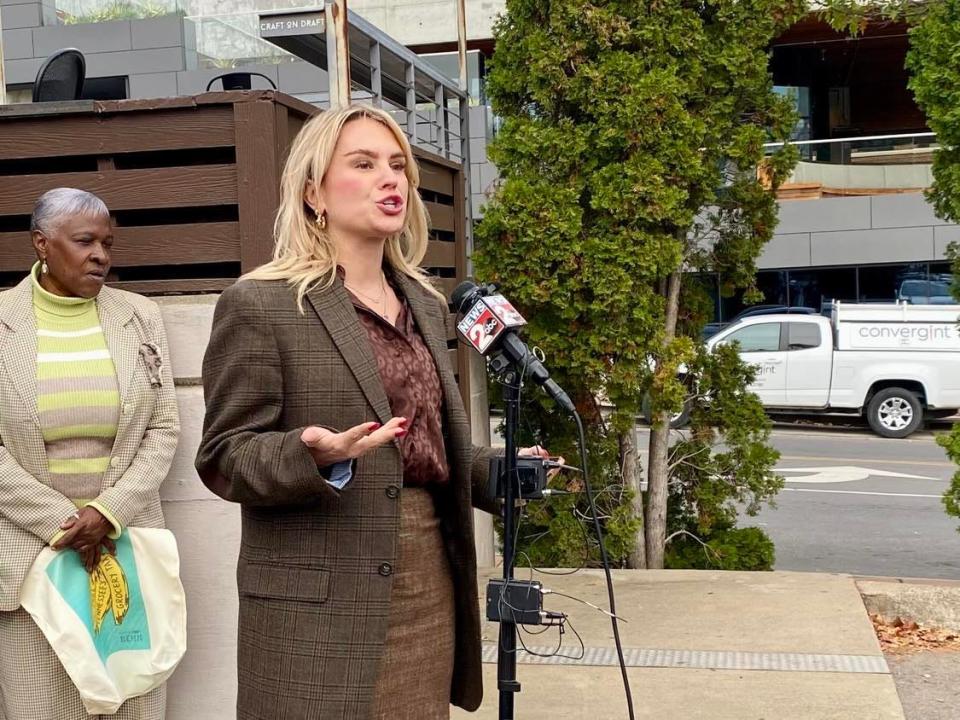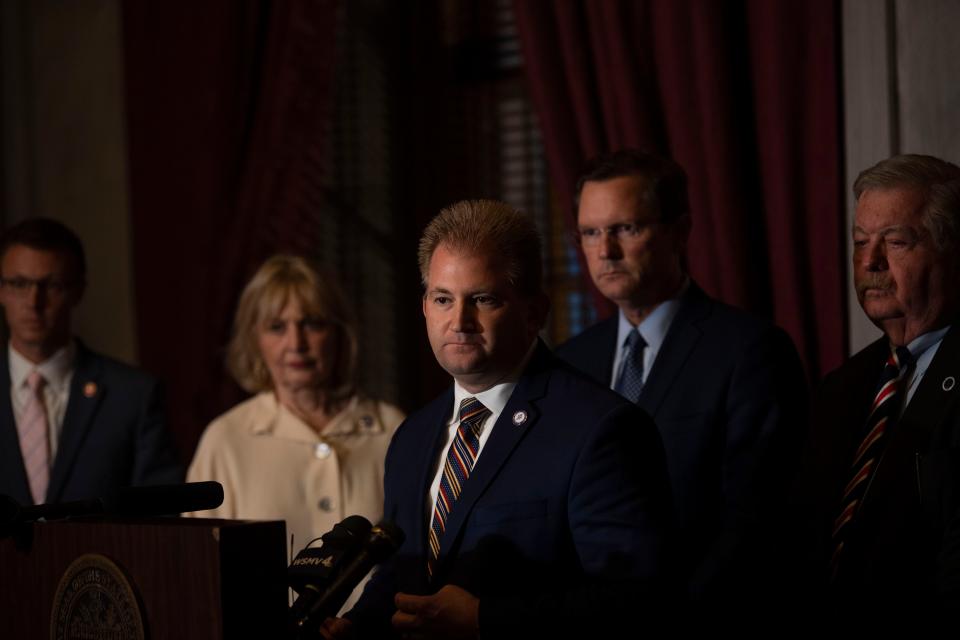Tennessee Democrats seek elimination of 4% grocery sales tax
- Oops!Something went wrong.Please try again later.
Democrats are again calling for a repeal of Tennessee’s sales tax on groceries, as inflation has driven up costs of ingredients for holiday meals.
In her first major news conference as a lawmaker, freshman Rep. Aftyn Behn, D-Nashville, announced Monday that she will propose legislation next year to eliminate Tennessee’s grocery sales tax, and close loopholes that allow many corporations in Tennessee to do business without paying state excise tax.
“We have a glaring imbalance in our tax system in the state of Tennessee,” Behn said. “While working-class families struggle to make ends meet, significant mega-corporations like FedEx and Amazon, through loopholes in offshore tax dodging, don't pay what they owe in taxes – all the while making record profits in the state of Tennessee.”
Tennessee is one of 13 states that still levies sales tax on food and groceries.
Behn will propose legislation in January with Sen. Charlane Oliver, D-Nashville, that will seek to abolish Tennessee’s grocery tax, and require corporations who do business in Tennessee to pay taxes based on worldwide combined reporting, aggregating profits and losses of all affiliated entities worldwide and paying taxes based on a Tennessee-specific share.

“From Chattanooga to Memphis, Tennesseans desperately want this,” Behn said, noting that her office has received hundreds of calls and emails since she first mentioned the idea.
Joining Behn in her announcement on Monday was Nashville businessman John Dyke, who owns The Turnip Truck grocery stores.
“Educators, emergency service personnel, and grocery workers shouldn’t be subject to a greater state tax than corporations with billions in revenue. Abolishing the grocery tax moves us toward this agenda,” Dyke said. “Unlike large corporations, small businesses lack the resources to influence lobbyists to secure tax reductions.”
Democrats in the state legislature have perennially proposed reducing the state’s grocery sales tax, but the idea has not gained support among Republicans. Behn hopes her proposal will see a different result.
“Republicans love a bill that pays for itself – and guess what? I have that,” Behn said. “I welcome them to join me across the aisle to do this.”
Republicans opt for temporary food tax reduction
Tennessee has one of the highest state grocery tax rates in the country, at 4%. Combined with local option sales tax, consumers can pay upward of 6.75% in sales tax on essentials like bread and milk.
Instead of an across-the-board rate cut, or total elimination, Republicans have opted to approve temporary grocery sales tax holidays in recent years. This year, Tennessee lawmakers approved a three-month grocery sales tax holiday from August through October, costing the state more than $270 million.
The last time that the state food sales tax rate was cut was during the Haslam administration, when the grocery tax was reduced from 5% to 4% in the IMPROVE Act, which put in place a higher gas and diesel tax. That legislation also cut business taxes for manufacturers by $113 million.
When asked this spring why lawmakers could not approve a modest grocery sales tax rate cut, Republican leaders cited economic uncertainty.

“I don’t trust the Biden economy to remain strong at all,” House Majority Leader William Lamberth, R-Portland, told The Tennessean in April. “Inflation is continuing to skyrocket. Families are suffering. When they go to the grocery store, they’re paying more than ever for milk, eggs, bread… For us to do any recurring cuts on taxes, we’re going to have to know that this nation’s economy is on solid ground.”
Amid stagnant revenues, Gov. Bill Lee did not commit to proposing another temporary tax cut next year, when asked on Monday. Instead, he said his team would continue considering what tax cuts could be possible to include in his budget proposal.
“Every year we should look at ways to reduce taxes,” Lee said. “That's almost always a part of the equation – what taxes are most effectively helpful to Tennesseans. The food tax [holiday] was helpful. We knew that. That’s why we made the decision to do it this year.”

Lee touted the state’s low overall tax burden on citizens, as the state does not have an income tax.
“Our citizens are taxed at a lower rate as a percentage of their personal income than any of the 50 States of America,” Lee said. “We are a very low-tax state. Tennesseans pay less in taxes than most other citizens across the country.”
Vivian Jones covers state politics and government for The Tennessean. Reach her at vjones@tennessean.com.
This article originally appeared on Nashville Tennessean: Nashville Democrat Rep. Aftyn Behn looks to cut TN sales tax on food

